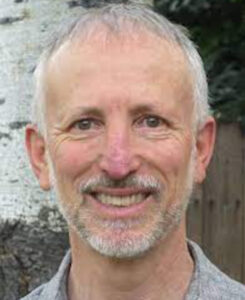Greg Scharf on “Deeper Into Here: Cultivating Radical Intimacy”
A reflection on practice by Greg Scharf
One useful metaphor for describing insight meditation is to see it as the practice, or process, of developing intimacy. The great 13th century Zen master Dogen was once asked: “What is the awakened mind?” He replied: “The mind that is intimate with all things.” In meditation we spend a lot of time observing both mind & body through the simple process of connecting directly with the ongoing flow, the flow of our experience, and as our practice deepens, so does intimacy.
Zen master Dogen was once asked: “What is the awakened mind?” He replied: “The mind that is intimate with all things.” In meditation we spend a lot of time observing both mind & body through the simple process of connecting directly with the ongoing flow, the flow of our experience, and as our practice deepens, so does intimacy.
I often call this a radical intimacy – a deep & radical intimacy with our own body & mind. Of course, sometimes we like what this intimacy reveals, and sometimes we don’t. Occasionally our mind & body do what we want, but far more often they don’t, and much of the time, we find ourselves at odds with some aspect of our experience. For example, we do everything we can to find a suitable arrangement for our sitting posture in mediation, but the body won’t stay comfortable: sooner or later it starts to hurt. Over the course of our life the body ages, gets sick, and eventually dies regardless of our efforts to have it be otherwise. The mind is even worse. It gets up to all kinds of nonsense & won’t stay where we put it but keeps wandering off. Over time it begins to become abundantly clear that we have little if any control over either body or mind. Perhaps there is something for us to investigate in all of this.
 One of the hardest things for us to learn in meditation is that this practice is not about having certain kinds of experiences or attaining special, blissful, or peaceful states. Of course, sometimes we do have what we might call special experiences, and there is nothing wrong with having them. They may serve us by bringing energy & interest to meditation but if we focus on them too much they may just get in the way. What we are interested in exploring are the universal characteristics or qualities that apply to all things – to any & every experience whether special or mundane, pleasant or unpleasant. We might call this the essential nature of all experience.
One of the hardest things for us to learn in meditation is that this practice is not about having certain kinds of experiences or attaining special, blissful, or peaceful states. Of course, sometimes we do have what we might call special experiences, and there is nothing wrong with having them. They may serve us by bringing energy & interest to meditation but if we focus on them too much they may just get in the way. What we are interested in exploring are the universal characteristics or qualities that apply to all things – to any & every experience whether special or mundane, pleasant or unpleasant. We might call this the essential nature of all experience.
Henry David Thoreau once said: “I went to the woods because I wished to live deliberately, to front only the essential facts of life, and see if I could not learn what it had to teach, and not, when I came to die, discover that I had not lived.” The power & beauty of the meditative experience is that it has the potential to bring us to the level of direct non-conceptual experience where we actually do front the essential facts of life – we get to the root, to the heart of things. These essential facts of life, of nature, are an aspect of any & all experience. This means that for our purposes – for the development of insight – it truly doesn’t matter what’s happening.
This is actually a profound & critical understanding that cuts through our tendency to judge certain experiences as wrong or bad, or as in the  way. Mindfulness has the power to transform perceived obstacles to meditation into objects of meditation. With mindfulness practice there is the implicit understanding that if it is in the way, it is the way. This understanding is not only a great relief, it is also empowering because it relieves us of the need to spend our time & energy in the futile attempt to control our experience.
way. Mindfulness has the power to transform perceived obstacles to meditation into objects of meditation. With mindfulness practice there is the implicit understanding that if it is in the way, it is the way. This understanding is not only a great relief, it is also empowering because it relieves us of the need to spend our time & energy in the futile attempt to control our experience.
If our happiness & freedom are dependent on having certain experiences, or achieving special sublime states, we’ll never find a true, lasting, freedom because states simply don’t last. Conditions are always changing & when they do change, we’re back where we started; there’s no real freedom there. True freedom is not found through gaining some kind of control over life, in order to have things be a certain way, but about coming into alignment & harmony with the way things are. We are not meditating in order to get something we don’t have or to go somewhere other than where we are right now. We are not going from here to there, we’re going deeper into here.
See more about Greg Scharf
